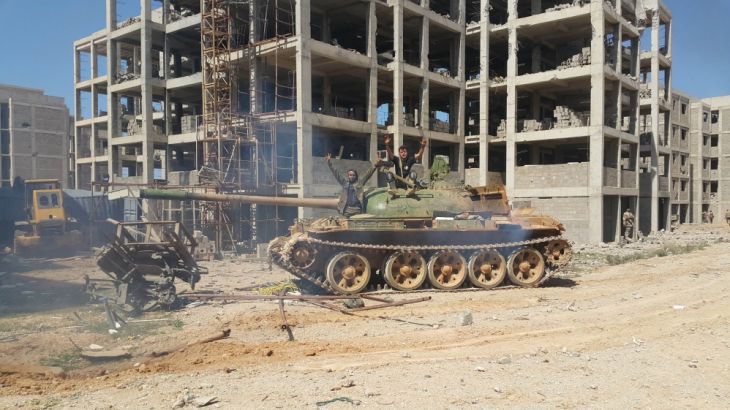Khalifa Haftar forces accused of Benghazi atrocities
Forces of renegade general Khalifa Haftar to investigate abuses after video emerges of troops parading with corpses.

Renegade General Khalifa Haftar will investigate abuses by his troops after images showing the public display of corpses and allegations of summary killings surfaced following the end of a siege in Benghazi last week.
Haftar’s self-styled Libyan National Army (LNA) said dozens of its opponents were killed as the siege in the eastern city was broken on Saturday when fighters and their families tried to escape.
Keep reading
list of 4 itemsCIA chief visits Libya after Lockerbie suspect handover
Libya: Violence to Votes
In Libya, anger and uncertainty after polls delayed
Soon after, photos and videos emerged on social media appearing to show LNA troops posing with corpses and parading the rotting body of a prominent opponent on a vehicle.
|
|
Eastern military figures, separate from internationally recognised officials in Tripoli in the west, present the LNA as an expanding and increasingly capable force that will eventually control the whole of Libya.
The LNA’s general command called on unit commanders to hand over all those filmed carrying out abuses to the military police, for questioning by a military committee.
“The actions carried out by members of the Libyan National Army after the liberation of west Benghazi are considered individual acts and do not represent the instructions of the army,” it said in a statement received by Al Jazeera.
“Those who committed these violations will be held accountable for their actions and for not following military law.”
READ MORE: EU roadmap for Libya to stem flow of sea migrants
The Benghazi Defence Brigades issued a statement, a copy of which was seen by Al Jazeera, denouncing what it called “the digging up of the graves … the mutilation of their dead bodies, and the killing of women and children”.
Libya’s Government of National Accord denounced “such criminal acts” and warned against Haftar’s forces moving in on Tripoli.
“The presidency council also denounces the statements made by the so-called General Command, led by Khalifa Haftar, threatening to enter the capital under the force of arms, an act that would force the country into a bloodbath and eliminate all efforts aiming at achieving consensus and national unity,” it said in a statement.

Farhan Haq, spokesperson for the UN secretary-general, said the UN had seen some reports on the digging up of graves by some of Haftar’s forces in Benghazi, adding it was seeking to obtain more information.
The abuse allegations raise fresh questions over the coherence of the LNA as a professional fighting body.
Haftar is widely assumed to be seeking national power. He has spurned the UN-backed government in Tripoli that has sought to unify political and armed factions that splintered into rival camps in the east and west in 2014, three years after the uprising that overthrew Muammar Gaddafi.
The LNA’s critics say it is a loose collection of armed groups with fickle loyalties and little discipline, similar to the militias operating in western Libya.
READ MORE: East Libyan forces claim victory in southwest Benghazi
They point to its slow progress in Benghazi, where it launched an operation against hardline fighters and other opponents nearly three years ago, but still faces pockets of resistance.
This month the LNA suffered a setback southwest of Benghazi, losing control of two oil ports before regaining them 11 days later.
It says it is now pursuing its opponents, who it accuses the UN-backed government of supporting, in the desert region of Jufra, while also preparing to “liberate” Tripoli from the armed groups that control it.
The offensive in Jufra and the LNA’s stated intention of taking control of the Tamanhent airbase risks triggering renewed fighting between the LNA and forces from the western city of Misrata, which control the base.
It comes as some of Misrata’s armed groups, which became powerful during the 2011 uprising and the conflicts that followed, have come under pressure in Tripoli where they have lost ground to local rivals and faced popular protests.
UN Libya envoy Martin Kobler warned on Monday of a “dangerous escalation across Libya emanating from the deteriorating security situation in Tripoli and events in Misrata and Benghazi”.
“I call for all parties to put Libya and the unity of Libya ahead of their own narrow interests. The violence, hate speech, and mutilation of corpses in Libya is completely unacceptable.”
|
|